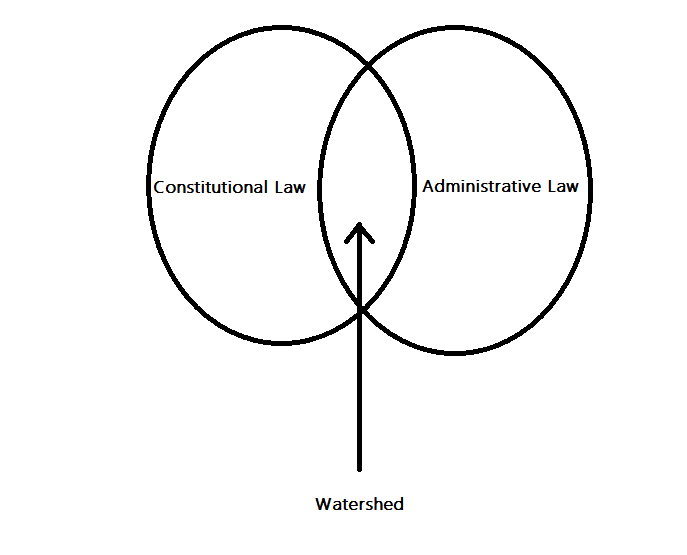Before we discuss the differences between these two mammoths i.e the Constitutional Law and Administrative Law, It is important we understand what exactly they mean in their individual capacity.
Table of Contents
What does Constitutional Law mean?
“Constitutional law is a body of law which defines the role, powers, and structure of different entities within a state, namely, the executive, the parliament or legislature, and the judiciary; as well as the basic rights of citizens and, in federal countries such as the United States, India, and Canada, the relationship between the central government and state, provincial, or territorial governments.” (Not an exhaustive definition though)
It is essential that all functions and actions of the state are orderly and in accordance with the principles as has been laid down in the constitution. Therefore, our fundamental rights, duties and the enormous powers that the state posses is because of Constitutional Law. Every other law derives its authority from this body.
What does Administrative Law mean?
“It is the body of law that governs the activities of administrative agencies of government. Government agency action can include rule making, adjudication, or the enforcement of a specific regulatory agenda.
Administrative law deals with the decision-making of such administrative units of government as tribunals, boards or commissions that are part of a national regulatory scheme in such areas as police law, international trade, manufacturing, the environment, taxation, broadcasting, immigration, and transport.”
Administrative law has become very necessary in the developed society, the relationship of the administrative authorities and the people had become very complex. In order to regulate these complex, relations, some law was necessary, which may bring about regularity, certainty and may check at the same time the misuse of powers vested in the administration, therefore, administrative law.
Why are we drawing a distinction between Administrative Law and Constitutional Law?
As every law of the state must satisfy the constitutional benchmark, it’s essential to know the relationship between them. Constitutional Law is the genus and Administrative Law its Species. Both of them are a part of the Public Law in the Modern State.
They in fact are both important streams of law that govern the various affairs of the State. It’s always an interesting question if there’s any difference between administrative law and constitutional law and if there lies a difference, What is the difference?
Arguments that Constitutional Law and Administrative Law are same-
According to the early English writers, there is no difference. Till recently the subject of Administrative Law was dealt with and discussed in the book of Constitutional Law and no separate and independent treatment was given to it. In many definitions of Administrative Law, it was included in Constitutional law.
Keith says, “It is logically impossible to distinguish administrative law from Constitutional Law, and attempts to do are so artificial”. Some jurists like Felix Frankfurter went a step ahead to call this exercise illegitimate and exotic.
Difference Between Constitutional Law and Administrative Law
According to Holland, “Constitutional Law describes various organs of the Government and Administrative Law describes them in motion”. The executive and legislative structure come in the purview of constitutional law and their working is governed by the other.
Ivor Jennings, says that “Administrative law deals with the organization, functions, powers, and duties of administrative authorities while general principles dealing with organization, powers of various organs and their mutual relationship is dealt with by constitutional law”.
Mait land was not the supporter of the view of Holland, He Said, “Constitutional Law deals with the structure and regulate the function and Administrative Law deals with the details of the function”.
John Gardner tells us, that the distinction between questions of constitutional law and questions of ordinary public law (also known as administrative law) lies in the sort of institutions that these respective parts of the law are trying to regulate. Administrative law regulates institutions whose powers are delegated that is ‘administrative institutions’. Constitutional law regulates those that do the delegating, i.e. institutions whose powers are not delegated but are, as it is sometimes put, inherent or original that is ‘constitutional institutions’.
India has a written Constitution which is considered to be the Grandnorm of the Legal System by many. Constitutional law is the supreme law of the country, no law is above the Constitution and hence must satisfy its provisions and not be in its violation. Administrative Law is subordinate to Constitutional Law.
While the constitution touches all branches of law and deals with general principles relating to the organization and power of the various organs of the state, administrative law only deals with the powers and functions of the Administrative authorities.
In countries that have written constitutions the difference between them is not so blurred as in England. In such countries, the source of constitutional law is the constitution while the sources of the others are the statutes, statutory instruments, precedents, and customs.
Whatever is the argument and counter-argument, the very fact today that administrative law is recognized as a separate independent branch of legal discipline though sometimes the discipline of both the said laws may overlap. The right position seems to be that if one draws two circles of each of these bodies, a certain place may overlap and this area could also be termed as ‘watershed’.
Doctrine of Watershed
As regards the relationship between them the correct position is said to be, if one draws two circles of Constitutional Law and Administrative Law at a certain place they may overlap and this area may be characterized as the ‘Watershed’ in Administrative Law.

This formulation doesn’t differentiate but it lays a whole emphasis on the organizations, powers, and duties to the exclusion of the way of their exercise.
A student of administrative law isn’t concerned with how a minister is appointed but only with how a minister discharges his functions in reference to an individual or a group. And how the minister of housing and rehabilitation is appointed isn’t the concern of administrative law but when this minister approves a scheme of the new township which involves the acquisition of homes and lands of persons living in the area questions of administrative law arise.
Here’s a resource that might help you understand the concept in a better way.
Conclusion
It is, therefore, we call the Constitutional Law and Administrative the ‘twin sisters’. There are differences and also there are similarities but each has its own fundamentals.
In other words, we can say that the structure of legislature in our country is the subject matter of constitutional law and its functions are the subject matter of administrative law. Both these subjects overlap each other at some point and enable provide for proper, responsive, and accountability in the government. Constitutional law is core law that gives very life and blood to the administrative law.
Related Topics:
| Best Constitutional Law Books For LLB Students | Administrative Law: An Introduction |
| All About Constitutional Amendments | The Constitution of India WIKI | Extensive Version |
Contributions such as these help us build and sustain a community of curious minds. We welcome Contributors to Sign up on our website through this link and send us their articles or blog posts.
Striving to create a community of like minds,
team SL,

Users not registered with Strictlylegal can Email us their content and the same are posted through this account. In case of abuse, kindly let us know at [email protected]




